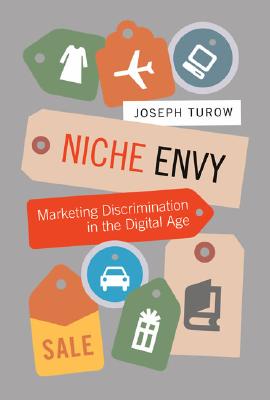

 MIT Press
MIT Press
Niche Envy: Marketing Discrimination in the Digital Age


Key Metrics
- Joseph Turow
- MIT Press
- Hardcover
- 9780262201650
- 9.1 X 6.3 X 0.74 inches
- 1.08 pounds
- Business & Economics > Marketing - Research
- English
 Secure Transaction
Secure TransactionBook Description
The price we pay for the new strategies in database marketing that closely track desirable customers, offering them benefits in return for personal information.
We have all been to Web sites that welcome us by name, offering us discounts, deals, or special access to content. For the most part, it feels good to be wanted--to be valued as a customer. But if we thought about it, we might realize that we've paid for this special status by turning over personal information to a company's database. And we might wonder whether other customers get the same deals we get, or something even better. We might even feel stirrings of resentment toward customers more valued than we are. In Niche Envy, Joseph Turow examines the emergence of databases as marketing tools and the implications this may have for media, advertising, and society. If the new goal of marketing is to customize commercial announcements according to a buyer's preferences and spending history--or even by race, gender, and political opinions--what does this mean for the twentieth-century tradition of equal access to product information, and how does it affect civic life? Turow shows that these marketing techniques are not wholly new; they have roots in direct marketing and product placement, widely used decades ago and recently revived and reimagined by advertisers as part of customer relationship management (known popularly as CRM). He traces the transformation of marketing techniques online, on television, and in retail stores. And he describes public reaction against database marketing--pop-up blockers, spam filters, commercial-skipping video recorders, and other ad-evasion methods. Polls show that the public is nervous about giving up personal data. Meanwhile, companies try to persuade the most desirable customers to trust them with their information in return for benefits. Niche Envy tracks the marketing logic that got us to this uneasy impasse.
Author Bio
Joseph Turow is Robert Lewis Shayon Professor of Media Systems & Industries at the Annenberg School for Communication. Turow is an elected Fellow of the International Communication Association and was presented with a Distinguished Scholar Award by the National Communication Association. A 2005 New York Times Magazine article referred to Turow as “probably the reigning academic expert on media fragmentation.”
In 2010, the New York Times called him “the ranking wise man on some thorny new-media and marketing topics.” In 2012, the TRUSTe internet privacy-management organization designated him a “privacy pioneer” for his research and writing on marketing and digital-privacy.
He has authored twelve books, edited five, and written more than 160 articles on mass media industries. His most recent books are The Voice Catchers: How Marketers Listen In to Exploit Your Emotions, Your Privacy, and Your Wallet (Yale, 2021), Media Today: Mass Communication in a Converging World (Routledge, 2020), and The Aisles Have Eyes: How Retailers Track Your Shopping, Strip Your Privacy, and Define Your Power (Yale, 2017).
In 2011, Yale University Press published his book The Daily You: How the New Advertising Industry is Defining Your Identity and Your World; a Turkish edition came out in 2015. In 2010, the University of Michigan Press published Playing Doctor: Television, Storytelling, and Medical Power, a history of prime time TV and the sociopolitics of medicine, and in 2013, it won the McGovern Health Communication Award from the University Of Texas College of Communication. Other books reflecting current interests are Niche Envy: Marketing Discrimination in the Digital Age (MIT Press, 2006); Breaking Up America: Advertisers and the New Media World (University of Chicago Press, 1997; paperback, 1999; Chinese edition, 2004); and The Hyperlinked Society: Questioning Connections in the Digital Age (edited with Lokman Tsui, University of Michigan Press, 2008).
Turow’s continuing national surveys of the American public on issues relating to marketing, new media, and society have received a great deal of attention in the popular press, as well as in the research community. He has been interviewed widely about his research, including by NPR’s Fresh Air with Terry Gross, The Atlantic, the BBC, CBS News, and elsewhere. He has also written about media and advertising for the popular press, including the New York Times,
The Atlantic, American Demographics magazine, the Washington Post, the Boston Globe, and the Los Angeles Times. His research has received financial support from the Digital Trust Foundation, the John D. and Catherine T. MacArthur Foundation, the Kaiser Family Foundation, the Robert Wood Johnson Foundation, the Federal Communications Commission, and the National Endowment for the Humanities, among others.
Turow was awarded a Lady Astor Lectureship by Oxford University. He has received several conference paper and book awards and has lectured widely. He was invited to give the McGovern Lecture at the University of Texas College of Communication, the Pockrass Distinguished Lecture at Penn State University, and the Chancellor’s Distinguished Lecture at Louisiana State University. He currently serves on the editorial boards of the Journal of Broadcasting and Electronic Media, the International Journal of Communication, and Media Industries.
He also has served as the elected chair of the Mass Communication Division of the International Communication Association.
Source: Annenberg School of Communication, University of Pennsylvania
Community reviews
Write a ReviewNo Community reviews


